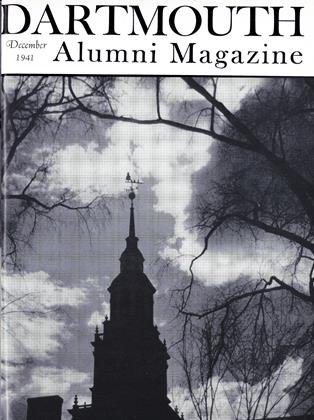IN THE SHORT WAVE PROGRAM that originated in Robinson Hallin Hanover, November 20, President Hopkins extended greetings toDartmouth, England, and to Dartmouth men serving in Great Britain'sarmed forces. The text of his remarks is printed below.
A T THIS MOMENT I count the radio a special blessing in that it gives me opportunity of extending greetings from the hills of Dartmouth in Northern New England to the hills of Dartmouth in Southern Old England. In availing myself of this privilege, my mind is filled with associations, often a source of delight in times past, of when I have landed at Plymouth and motored about through your glorious Devonshire or of when in grateful leisure I have taken the lovely river trip down from Totnes.
Then were available the attributes of a life which, under England's protective sense of responsibility, is being saved for us—a life replete with beauty and happiness in which men in individual freedom under law, could dream their own dreams, could think their own thoughts, could strive for fulfillment of their own aspirations, and could seek the satisfaction of peace uninterrupted by the constant clamor and the appalling din of war. This was a way of life which had been made possible for us by our common forbears who, through centuries, had fought valiantly to secure it for us in spite of persecution and imprisonment. And slowly, but ever cumulatively, the blessings of the liberties in this way of life were becoming more widely distributed in Old England and among those of us who share her heritage across the sea.
Now interruption has come, but under the guardianship of you people who more than any other have not only lighted the fires of freedom, but through long centuries have fanned these into a steady blaze, the flame still burns and its light is being shed upon many lands that without England would be enshrouded in hopeless darkness.
It is a common trait among men of the same family to be more reserved in admitting their mutual admirations than they would be to outsiders. Nevertheless, we of this transatlantic world, which is still new, know whence our freedoms sprang and the worth of the guardianship which has been given to these by England when they were little more than an occasional voice crying in the night. In wonder at first at your fortitude, then in admiration, and finally with daily increasing sense of obligation, the hesitating collaboration of earlier days in America is working toward full cooperation. At this time the Dartmouth of the New England hills is, I believe, representative of an ever increasing multitude of communities throughout the United States which look forward to the time when we shall stand shoulder to shoulder with communities like yours, so attractively placed upon the River Dart.
It is a tragic circumstance that there should be those among the peoples of the earth who still believe that might makes right and that the only law which demands obedience is the law of force. However, to those in whom no understanding exists of arguments apart from force, the democracies can present even these arguments effectively, and ere long they will!
To my friends in England of the family from which Dartmouth College derived its name, friends whom I hold in happy recollection, I would send greetings at this time.
And to the greatly honored fellow-citizen of this, my native State of New Hampshire, and my long-time personal friend, Ambassador Winant, I send admiring regards.
And most of all at this time I wish to send greetings and assurances of our solicitous interest for and pride in those men of this College now in His Majesty's service and training amongst your people. To them, listening in to this broadcast from their college campus, I would say almost with tearful affection, "The Mother keeps them in her heart And guards their altar flame; The still North remembers them, The hill-winds know their name."
To the boys who are listening, good luck and good night!
 View Full Issue
View Full Issue
More From This Issue
-
 Article
ArticleSocial Idealism in College
December 1941 By ARTHUR E. JENSEN -
 Sports
SportsBig Green Teams
December 1941 By Frank Hall '41 -
 Article
ArticleRediscovering the College Seal
December 1941 By RAY NASH -
 Class Notes
Class Notes1937*
December 1941 By DONALD C. MCKINLAY, ARTHUR H. RUGGLES JR. -
 Class Notes
Class Notes1912*
December 1941 By CONRAD E. SNOW, RICHARD C. PLUMER -
 Class Notes
Class Notes1919*
December 1941 By WINDSOR C. BATCHELDER, MAX A. NORTON







